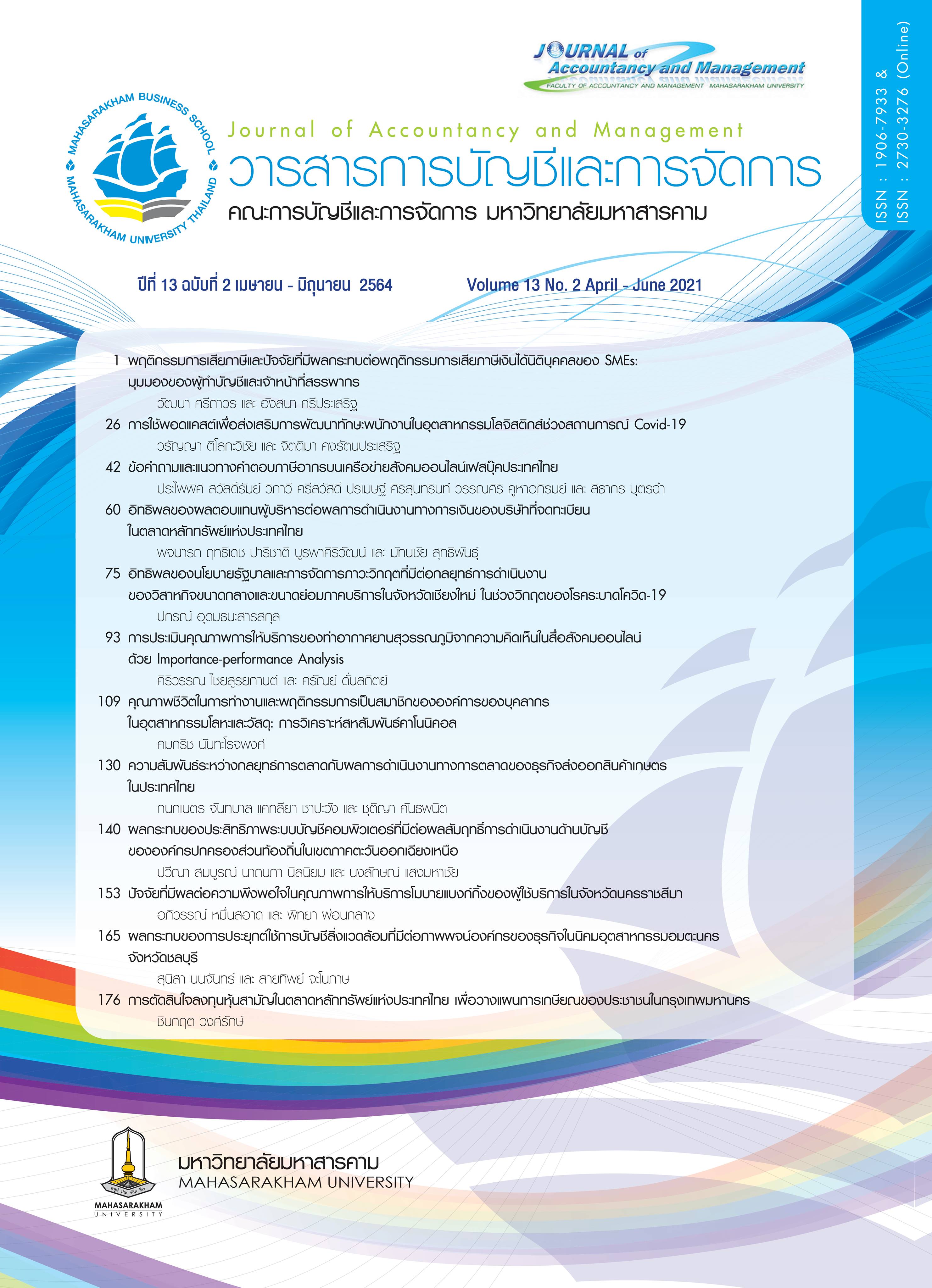อิทธิพลของนโยบายรัฐบาลและการจัดการภาวะวิกฤตที่มีต่อกลยุทธ์การดำเนินงาน ของวิสาหกิจขนาดกลางและขนาดย่อม ภาคบริการในจังหวัดเชียงใหม่ ในช่วงวิกฤต ของโรคระบาดโควิด-19
Main Article Content
บทคัดย่อ
การวิจัยนี้มีวัตถุประสงค์เพื่อศึกษาอิทธิพลของนโยบายรัฐบาลและการจัดการภาวะวิกฤตที่มีต่อกลยุทธ์
การดำเนินงานของวิสาหกิจขนาดกลางและขนาดย่อมภาคบริการ ในจังหวัดเชียงใหม่ ในช่วงวิกฤตของโรคระบาด
โควิด-19 ใช้แบบสอบถามออนไลน์เป็นเครื่องมือในการเก็บรวบรวมข้อมูลจากกลุ่มตัวอย่างผู้ประกอบการวิสาหกิจขนาดกลางและขนาดย่อมภาคบริการ ในจังหวัดเชียงใหม่ จำนวน 382 คน วิเคราะห์ข้อมูลด้วยสถิติพรรณนา คือ
ค่าร้อยละ ค่าเฉลี่ย และส่วนเบี่ยงเบนมาตรฐาน และสถิติอนุมาน คือ ค่าสัมประสิทธิ์สหสัมพันธ์และการวิเคราะห์ถดถอยเชิงพหุคูณ (Multiple Regression Analysis) ผลการศึกษา พบว่า 1) ระดับความคิดเห็นเกี่ยวกับปัจจัยนโยบายรัฐบาลและการจัดการภาวะวิกฤต ในภาพรวมอยู่ในระดับมาก มีค่าเฉลี่ยเท่ากับ 3.89 และ 3.58 ขณะที่การดำเนินงานของธุรกิจขนาดกลางและขนาดย่อมภาคบริการในช่วงวิกฤตของโรคระบาดโควิด-19 ในภาพรวมอยู่ในระดับปานกลาง ค่าเฉลี่ยเท่ากับ 3.32 2) ผลการวิเคราะห์ถดถอยพหุคูณ พบว่า นโยบายรัฐบาลและการจัดการภาวะวิกฤตมีอิทธิพลเชิงบวกต่อกลยุทธ์ การดำเนินงานของวิสาหกิจขนาดกลางและขนาดย่อม ภาคบริการ ในช่วงวิกฤตของโรคระบาดโควิด-19 อย่างมีนัยสำคัญทางสถิติที่ระดับ 0.05 โดยมีค่าสัมประสิทธิ์ถดถอย (β) เท่ากับ 0.626 และ 0.521 ตาม ลำดับ สามารถอธิบายกลยุทธ์การดำเนินงานของวิสาหกิจขนาดกลางและขนาดย่อมภาคบริการได้ร้อยละ 72.20 (R2 = 0.722) โดยนโยบายรัฐบาลเป็นปัจจัยที่มีอิทธิพลมากที่สุด
Downloads
Article Details
บทความที่ได้รับการตีพิมพ์เป็นลิขสิทธิ์ของวารสารการบัญชีและการจัดการ
ข้อความที่ปรากฏในบทความแต่ละเรื่องในวารสารวิชาการเล่มนี้เป็นความคิดเห็นส่วนตัวของผู้เขียนแต่ละท่านไม่เกี่ยวข้องกับมหาวิทยาลัยมหาสารคาม และคณาจารย์ท่านอื่นๆในมหาวิทยาลัยฯ แต่อย่างใด ความรับผิดชอบองค์ประกอบทั้งหมดของบทความแต่ละเรื่องเป็นของผู้เขียนแต่ละท่าน หากมีความผิดพลาดใดๆ ผู้เขียนแต่ละท่านจะรับผิดชอบบทความของตนเองแต่ผู้เดียว
เอกสารอ้างอิง
กรมควบคุมโรค กระทรวงสาธารณสุข. (2564). จํานวนผู้ติดเชื้อโควิดในประเทศรายใหม่และสะสม. ค้นเมื่อ 17 เมษายน 2564, จาก https://ddc.moph.go.th/viralpneumonia/file/scoreboard/scoreboard_23042564.pdf
ธนาคารแห่งประเทศไทย. (2564). รายงานแนวโน้มเศรษฐกิจธุรกิจ. ค้นเมื่อ 22 กุมภาพันธ์ 2564, จาก https:// bot.or.th/Thai/MonetaryPolicy/EconomicConditions/BLP/BLP_TH_Q4_2020_hra6gjp6.pdf
เสาวนีย์ จันทะพงษ์ และทศพล ต้องทุ้ย. (2563). เศรษฐกิจโลก เศรษฐกิจไทยหลังโควิด 19 : โรคปฏิวัติโลก ยกเครื่องสู่อนาคตวิถีชีวิตใหม่. BOT พระสยาม MAGAZINE, 3 (44), 4-5.
ศักดิ์ดา ศิริภัทรโสภณ. (2563). โรคระบาดไวรัสโคโรนาสายพันธุ์ใหม่ (COVID-19): ผลกระทบต่อวิสาหกิจขนาดกลางและขนาดย่อมของไทยและกลยุทธ์ในการฟื้นฟูกิจการ. วารสารสมาคมนักวิจัย, 25 (2), 10-30.
สำนักงานจังหวัดเชียงใหม่. (2564). บรรยายสรุปจังหวัดเชียงใหม่. ค้นเมื่อ 22 กุมภาพันธ์ 2564, จาก http://www.chiangmai.go.th/ managing/public/D8/8D22Oct2020145452.pdf
สำนักงานส่งเสริมวิสาหกิจขนาดกลางและขนาดย่อม. (2564). ข้อมูลจำนวนผู้ประกอบการ. ค้นเมื่อ 24 กุมภาพันธ์ 2564, จาก https://sme.go.th/th/page.php?modulekey=348
สำนักงานส่งเสริมวิสาหกิจขนาดกลางและขนาดย่อม. (2564). ผลการสำรวจ SMEs ที่ได้รับผลกระทบจากสถานการณ์การแพร่ระบาดของโรคติดเชื้อไวรัสโคโรนา 2019 (COVID-19). ค้นเมื่อ 24 กุมภาพันธ์ 2564, จาก https://www.sme.go.th/upload/mod_download/download-20210302115054.pdf
อมราวดี ไชยโย และเมทนี มหาพรหม. (2563). การจัดการภาวะวิกฤตของธุรกิจที่พักแรมในประเทศไทยภายใต้วิกฤตการณ์ COVID-19. วารสารวิทยาลัยดุสิตธานี, 14 (3), 685-700.
Abubakar, A. (2020). Coronavirus (COVID-19): Effect and survival strategy for businesses. Journal of Economics and Business, 3 (2), 661-671.
Ahmad R.C., O., Suraiya, I., & Mohd A., J. (2020). The impact of Covid-19 movement control order on SMEs’ businesses and survival strategies. Malaysian Journal of Society and Space, 16 (2), 139-150.
Alves, J. C., Lok, T. Ch., Luo, Y. B., & Hao, W. (2020). Crisis management for small business during the COVID-19 outbreak: Survival, resilience and renewal strategies of firms in Macau. Retrieved February 15, 2021, from https:// researchsquare.com/article/rs-34541/v1
Azmi, W., Aida, I., & Diana, A.W. (2020). The role of strategic management in growth of small and medium enterprises (SMEs) in Malaysia. e-Bangi Journal of Social Sciences and Humanities, 17 (1), 108-124
Bishop, P. (2019). Knowledge diversity and entrepreneurship following an economic crisis: An empirical study of regional resilience in Great Britain. Entrepreneurship & Regional Development, 31(5-6), 496-515.
Beirman, D. (2011). The Integration of emergency management and tourism. Australian Journal of Emergency Management, 26 (3), 30-34.
Chatzoglou, P., Chatzoudes, D., Sarigiannidis, L., & Theriou, G. (2018). The role of firm specific factors in the strategy-performance relationship: Revisiting the resource-based view of the firm and the VRIO framework. Management Research Review, 40 (1), 46-73.
Effendi, M. I., Sugandini, D., & Istanto, Y. (2020). Social media adoption in SMEs impacted by COVID-19: the TOE model. The Journal of Asian Finance, Economics and Business, 7 (11), 915–925.
Grondys, K., Ślusarczyk, O., Hussain, H., & Androniceanu, A. (2021). Risk assessment of the SME sector operations during the COVID-19 pandemic. International Journal of Environmental Research and Public Health, 18 (8), 4183.
Hair, J. F., Jr., Black, W. C., Babin, B. J., & Anderson, R. E. (2010). Multivariate data analysis: A global perspective (7th edition). New Jersey : Prentice Hall.
Huang, C., Wang, Y., Li, X., Ren, L., Zhao, J., Hu, Y., & Cheng, Z. (2020). Clinical features of patients infected with 2019 novel coronavirus in Wuhan, China. The Lancet, 395 (10223), 497-506.
Kuckertz, A., Brändle, L., Gaudig, A., Hinderer, S., Morales Reyes, C. A., Prochotta, A., & Berger, E. S. C. (2020). Startups in times of crisis – a rapid response to the COVID-19 pandemic. Journal of Business Venturing Insights, 13, e00169.
Kurschus, R. J., Sarapovas, T., & Cvilikas, A. (2015). The criteria to identify company's crisis in the SME sector. Engineering Economics, 26 (2), 152-158.
Marko, K., Tanja, P. &, Marijana, S. (2020). Crisis management practices in tourism SMEs during the Covid-19 pandemic. Organizacija, 53 (4), 346-361.
Muñoz, P., Kimmitt, J., Kibler, E., & Farny, S. (2019). Living on the slopes: Entrepreneurial preparedness in a context under continuous threat. Entrepreneurship & Regional Development, 31 (5-6), 413-434.
Ngoc Su, D., Luc Tra, D., Thi Huynh, H. M., Nguyen, H. H. T., & O'Mahony, B. (2021). Enhancing resilience in the Covid-19 crisis: Lessons from human resource management practices in Vietnam. Current Issues in Tourism, 1–17.
Palmer, A., & Hartley, B. (2009). The business environment. (6th ed.). New York : McGrew Hall.
Pearson, C. M., & Clair, J. A. (1998). Reframing crisis management. Academy of Management Review, 23 (1), 59-76.
Runyan, R.C. (2006). Small business in the face of crisis: Identifying barriers to recovery from a natural disaster. Journal of Contingencies and Crisis Management, 14 (1), 12-26.
Svatošová, V. (2019). Identification of financial strategy in small and medium-sized entrepreneurship. ACTA Universitasis Agriculturae ET Silviculturae Mendelianae Brunensis, 65 (4), 1435-1453.
Yamane, T. (1973). Elementary sampling theory. New York : Harper and Row.
Yi, L., Jing W., Junlin, P., & Li, L. (2020). The perceived impact of the Covid-19 epidemic: evidence from a sample of 4807 SMEs in Sichuan province, China, Environmental Hazards, 19 (4), 323-340.
World Health Organization. (2019). Coronaviruses. (Online). Retrieved March 10, 2021, from https://who.int/thailand/health-topics/coronavirus.


